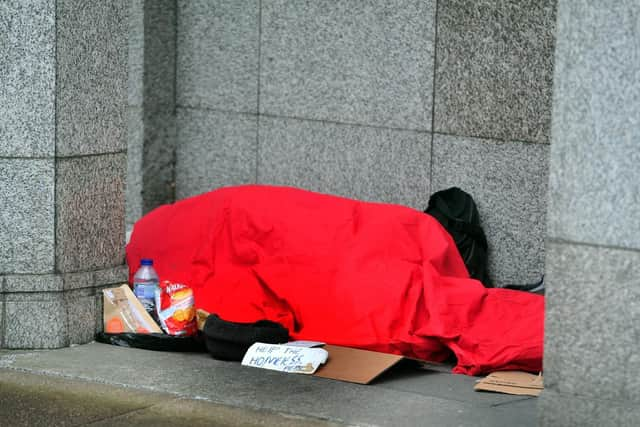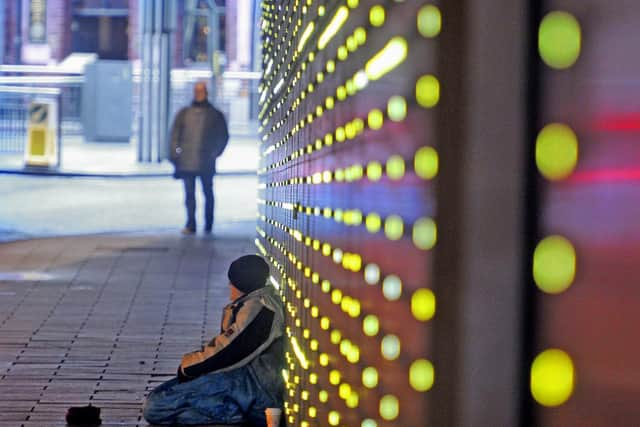How the coronavirus lockdown is helping homeless people in Leeds to re-build their lives
and live on Freeview channel 276
The city's homeless and rough sleepers are among the most vulnerable when it comes to being at risk of contracting coronavirus and also of experiencing its most severe effects.
In a Yorkshire Evening Post special report on the impact of coronavirus on social inequality, we look at how health is actually being improved for one of the most marginalised but visible sections of the city's community.


Advertisement
Hide AdAdvertisement
Hide AdIn a study of homeless people aged 39 and under, 11 per cent had one of these illnesses and cardio-vascular disease compared with six per cent of the general population. And, 22 per cent of homeless people have one of these conditions, and COPD, compared with 14 per cent of the rest of the general population.
Among homeless people the average life expectancy can be between 40 an 45 and that is a figure that is coming down over time too.
Dr Lucy Chiddick is the Clinical Lead for Health Inequalities at NHS Leeds CCG and says homeless people are more at risk, but health care provision only makes up 20 per cent of the picture.
She says it is often found to be traumatic events in childhood that contribute to the reasons why people end up being rough sleepers out on the streets.


Advertisement
Hide AdAdvertisement
Hide AdShe said: "People that I support have the worst outcomes of any vulnerable population. They are the most marginalised with the most health needs. There is a question around health inequalities and what that means for disease. Education, income, health behaviours surrounding alcohol and drugs, physical environment, housing, air and water quality. Only 20 per cent is clinical care and health inequality is a huge thing.
"We need a co-produced response. When you work as a GP with some of the most socially excluded groups you can see that in front of you day in, day out. What you want to see is a partnership approach to tackling this at systematic level."
However, since the coronavirus lockdown there has been a rapid response between outreach teams and Leeds City Council which has worked to get the city's rough sleepers in hotel accommodation around Leeds.
For some it is the first time they have known they are safe and where their next meal is coming from for years. For others it is a chance to change what have become destructive habits and tackle barriers that have prevented them from escaping the streets before.
Advertisement
Hide AdAdvertisement
Hide AdDr Chiddick added: "There is this wrap-around response and it is so unique to have them all in one place. There is huge potential to have the opportunity to have needs addressed when you think about the hierarchy of need."
She explains: "Everything is coming together at the right time, in the right place. They might have been sorted with health but not quite sorted with housing or they could have addressed mental health but not co-ordinated the housing need. They need to co-ordinate at the right time and this presents that opportunity.
"I have already seen it with some of the patients that I consult with. There is opportunity and they can think about where they want to be. I have heard from some that say they can't believe they are in a safe place.
"There are many contributing factors when you deal with addiction and other needs. Health is at the bottom of your scale of priorities because there are so many other needs. Where do you bed down for the night, get food, money and service the addiction? If you have not got to think about that and have a safe, warm place it means you have been able to get support for addiction so that brings you to health and the time to try to deal with that.
Advertisement
Hide AdAdvertisement
Hide Ad"It (coronavirus lockdown) is an awful thing . People are having to manage difficult situations but there are unique opportunities that arise out of this situation - it is really interesting."
A message from the Editor:
Thank you for reading this story on our website. These are challenging times but the team at the Yorkshire Evening Post need your support more than ever in the weeks ahead.
While I have your attention, I also have an important request to make of you. In order for us to continue to provide high quality and trusted local news on this free-to-read site, I am asking you - wherever possible and providing it is safe for you to do so - to also please purchase a copy of our newspaper.
Inevitably falling advertising revenues will start to have an impact on local newspapers and the way we continue to work during this period of uncertainty. So the support of our readers has never been more important as we try to make sure that we keep you connected with the city you live in during this time. But being your eyes and ears comes at a price. We need your support more than ever to buy our newspapers during this crisis.
Advertisement
Hide AdAdvertisement
Hide AdOur team of trusted reporters are working incredibly hard behind the scenes - from kitchen tables and spare bedrooms - to look at how we can do this and your continued support to the YEP will help to protect its viability in the days and weeks ahead.
For more details on our subscription offers please visit www.localsubsplus.co.uk/YEP, email [email protected] or call us on 0330 4033004.
Thank you
Laura Collins
Editor